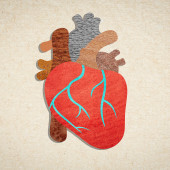Latest Releases
Find our latest releases below. After searching, you can view the most recent releases by clearing the search.
Browse experts on:

Four leaders in their fields will be honored during Northwestern commencement
February 18, 2025
Northwestern University will present honorary degrees to poet Toi Derricotte, Chief of Naval Operations Admiral Lisa Franchetti, pathbreaking biochemist and cell biologist Marc Kirschner and actor and comedian Steve Carell during its 167th Commencement ceremony on Sunday, June 15, at the United Center.

Flickers and flares: Milky Way’s central black hole constantly bubbles with light
February 18, 2025
Using NASA’s James Webb Space Telescope (JWST), a Northwestern University-led team of astrophysicists has gained the longest, most detailed glimpse yet of the void that lurks in middle of our galaxy. The swirling disk of gas and dust (or accretion disk) orbiting the central supermassive black hole, called Sagittarius A*, is emitting a constant stream of flares with no periods of rest.

Wage theft rises sharply in L.A. fast food restaurants
February 17, 2025
Minimum wage violations are rising sharply at fast food restaurants in Los Angeles and surrounding areas, according to a report by researchers at Northwestern University and Rutgers University.

A cosmic love story
February 13, 2025
As the black holes orbit one another, each object has its own spin. While previous research indicated these spins should be chaotic and random, the Northwestern scientists found binary black holes tend to spin in the same general direction as the pair’s overall orbital motion.

Astrophysicist Adam Miller receives Cottrell Scholar Award
February 13, 2025
Northwestern University astrophysicist Adam Miller has received a 2025 Cottrell Scholar Award from the Research Corporation for Science Advancement (RCSA), the United States’ first foundation wholly dedicated to science.

Northwestern’s Teplin and Hirschhorn to speak at annual AAAS meeting Feb. 14
February 13, 2025
Two Northwestern University faculty will speak at this year’s American Association for the Advancement of Science (AAAS) annual meeting in Boston on Friday, Feb. 14.
* Media Advisory
* Media Advisory

Steve Carell, award-winning actor, will be Northwestern’s commencement speaker
February 13, 2025
Award-winning actor, writer and producer Steve Carell will deliver this year’s commencement address to Northwestern University’s Class of 2025.

The complicated world of compounded weight-loss drugs
February 7, 2025
The recent backlash over telehealth company Hims & Hers’ upcoming SuperBowl ad selling compounded weight-loss drugs speaks to the complicated nature of weight loss in America today, say Northwestern University obesity experts Drs. Justin Ryder and Veronica Johnson.
* Media Advisory
* Media Advisory

Why babies recover, but adults scar, after heart damage
February 7, 2025
Newborns with heart complications can rely on their newly developed immune systems to regenerate cardiac tissues, but adults aren’t so lucky. A new Northwestern Medicine study in experimental animals reveals a critical difference in how macrophages — a part of the immune system — help repair the heart in newborns versus adults after a heart attack.

Economics and deportation experts on DOJ lawsuit against Illinois’ sanctuary laws
February 7, 2025
Journalists seeking expert sources to weigh in on the Department of Justice lawsuit claiming that local and state laws violate federal immigration law are invited to reach out to professors of political science and economics at Northwestern University.
* Media Advisory
* Media Advisory